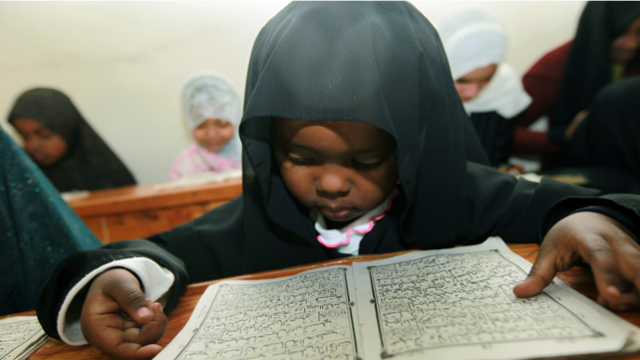The Quranic Arabic Crisis in Muslim Schools

By Abdul Malik Mujahid
‘Ihdinas Siratul Mustaqeem’ (Guide us the Straight Way) is what we ask Allah in each Salat at least 4 times.
We repeat this over and over again, thereby stressing our constant need for guidance.
Guidance is right there – in the Quran, only if we can understand its language.
I mean not just comprehending a couple of verses of the Quran here and there. I mean knowing the Arabic of the Quran enough to realize what Allah is telling us when an imam is reciting the Quran or we are reading it.
Almost 80% of Muslims, who are non Arabs, face this challenge. If Muslims are directly connected with the guidance sent to them by Allah, their prayer of ihdinas Siratal Mustaqeem will be meaningful.
For this prayer to have any meaning, the hundreds of Sunday Islamic schools and full time Muslim schools in North America would have as a priority educational goal the task of task of getting children to understand the Quran.
Islamic schools: Not only a refuge from temptation
It is not without some relief and pride that many parents watch their kids graduate from Islamic schools.
The relief often comes from the knowledge that their kids have passed through probably the worst years of their lives (their teens) in a more Islamic environment than any public school can offer.
The pride (I’m referring to a healthy pride and thankfulness to Allah, not arrogance) comes from knowing their child has more knowledge of Islam than if they had attended a public school.
But on this point, they are often dead wrong.
It is unfortunately true to say that most kids who graduate from an Islamic school in North America cannot understand Quranic Arabic. And this is after years of study.
Oh sure, they may know how to read the Message of Allah fast and beautifully. But do they know what they are reading? And do we care?
A “soft class”
It is very sad to know that ‘Understanding Quranic Arabic’ in many Islamic schools is seen as a ‘soft’ class. In other words, it’s like the easy classes you take in college to boost your G.P.A. while you concentrate on the more difficult courses. It’s an easy A.
Why?
Because the teachers will pass you so easily, it will make no difference whether you can understand Quranic Arabic or not. You might fail math, you might fail English, but Quranic Arabic, most likely not.
Contrast this with college students who, with no prior exposure to Arabic, have taken the language as a year or semester-long course and can read and understand an Arabic newspaper, and even converse in Arabic. These students often have a better understanding of Arabic vocabulary and grammar than bright and energetic students of Islamic schools who have been attending Arabic classes for years.
Something is definitely not right. There is a big problem and those concerned need to be looking at ways to solve it.
Sending our kids to Muslim schools must not only be a way to protect them from sex, drugs, alcohol and the many other trials and temptations present in public schools.
Those well meaning Muslims who are doing the jihad of establishing and running the Islamic school know how difficult it is to raise funds for it.
Muslim parents and educators must emphasize that Muslim schools need to go beyond teaching the Alif, Baa, Taa’s of Arabic and Islam to something more meaningful and worthy of the Quran itself.
Quranic Arabic needs to be put back on the agenda.
Parents and educators need to set clearly defined goals and academic objectives.
Appropriate syllabuses need to be developed to cater for the needs of non-Arabic speaking students in particular.
More intensive courses need to be developed – especially from grades six to twelve, to ensure better concentration and focus.
A more credible system of testing and evaluating and promoting students need to be put in place. Students need to have end-of-year targets as they are obliged to in topics like math and science.
Schools need to ensure that competent language teachers are employed and a system of teacher training developed and implemented to ensure that effective and professional methods of language teaching find their way into the classroom.
We need more open discussion of this major problem and detailed suggestions on each of the above.
Losing the meaning of the message
Quranic Arabic must be taken more seriously by all, students, parents, teachers, school administrators and Muslims in general. Allah has blessed us with guidance not for it to be memorized and ignored, but to be understood and implemented.
Otherwise, how many of the hearts of our Muslim children will be left like that of Joseph Abraham: dry like a desert, and seemingly endless and hopeless?


